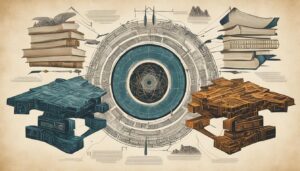
In today’s digital age, virtual libraries have become a gateway to a vast treasure trove of biblical archaeological findings. These online collections offer an unparalleled opportunity to explore and delve into the rich history, culture, and stories of the Bible through ancient texts, artifacts, and research materials. With just a few clicks, we can now access and study these invaluable resources from the comfort of our own homes.
Key Takeaways:
- Virtual libraries provide digital access to a wealth of biblical archaeological findings.
- They eliminate the need for physical visits to multiple locations by bringing the artifacts and texts to our screens.
- These online collections offer high-resolution images, comprehensive search functionalities, and educational resources.
- Notable virtual libraries include the Digital Dead Sea Scrolls, The Leon Levy Dead Sea Scrolls Digital Library, and the British Library’s Digitised Manuscripts.
- Virtual libraries have revolutionized the study of biblical archaeology, leading to new discoveries and interpretations.
The Importance of Virtual Libraries in Biblical Archaeology
Virtual libraries play a crucial role in biblical archaeology by providing easy access to ancient biblical texts and artifacts. These digital collections are of immense importance to researchers, scholars, and enthusiasts alike. They offer a convenient platform for exploration and research, eliminating the need for physical visits to multiple locations around the world.
One of the key advantages of virtual libraries in biblical archaeology is their ability to broaden the dissemination of knowledge. Researchers can now access a vast range of texts, manuscripts, and artifacts virtually, enabling them to study and analyze these valuable resources without barriers of time or distance.
Moreover, virtual libraries facilitate collaboration among researchers in the field. By creating a shared online space, virtual libraries invite scholars from different parts of the world to collaborate on projects, exchange ideas, and collectively contribute to the study of biblical archaeology.
In addition, virtual libraries enable users to compare and cross-reference different texts and artifacts, leading to new insights and interpretations. This collaborative approach enhances the overall understanding of biblical archaeology and contributes to the advancement of knowledge within the field.
Accessible and Comprehensive Resources in Virtual Libraries
“Virtual libraries bring together a wealth of historical and archaeological resources, making them accessible to a global audience. These digital collections provide researchers with a comprehensive platform to explore, study, and analyze ancient biblical texts and artifacts.” – Dr. Elizabeth Stone, Archaeologist
Virtual libraries boast an array of features and benefits that significantly enhance the study of biblical archaeology. Here are a few notable aspects:
- High-resolution imagery: Virtual libraries offer high-quality scans and images of ancient texts, manuscripts, and inscriptions. These detailed visuals enable researchers to closely examine and analyze the minute details of these artifacts without the need for physical presence.
- Advanced search functionalities: Users can easily search for specific texts, references, or subjects of interest within virtual libraries, allowing for efficient research and retrieval of relevant information.
- Educational resources: Virtual libraries often provide curated exhibits, interactive maps, and multimedia presentations that enhance the learning experience and enable users to engage with biblical archaeology in a dynamic and immersive way.
By harnessing these features and benefits, virtual libraries play a transformative role in biblical archaeology, expanding the possibilities for research, analysis, and interpretation within the field.
Comparison of Physical Vs. Virtual Library Resources
| Aspects | Physical Libraries | Virtual Libraries |
|---|---|---|
| Access | Limited by physical location and availability of resources. | Accessible from anywhere with an internet connection. |
| Diversity of Resources | Reliant on physical collections housed in specific libraries or institutions. | Aggregates diverse resources from multiple libraries and institutions worldwide. |
| Collaboration | Restricted by geographic constraints, limiting collaborative possibilities. | Encourages collaboration among researchers globally, fostering exchange of knowledge and ideas. |
| Preservation | Physical documents are susceptible to damage, decay, or loss. | Digital preservation ensures long-term accessibility and conservation of resources. |
Features and Benefits of Virtual Libraries
Virtual libraries are invaluable tools for studying biblical archaeology, providing a wide range of features and benefits that enhance the exploration and understanding of ancient texts and artifacts. These digital collections offer a plethora of resources, from high-resolution images and scans of manuscripts to comprehensive search functionalities and educational materials. Let’s delve into the key features and benefits of virtual libraries in the context of biblical archaeology.
High-Resolution Images and Scans
One of the notable advantages of virtual libraries is the availability of high-resolution images and scans of ancient manuscripts, artifacts, and inscriptions. These detailed visuals allow researchers to closely examine and analyze the intricate details of these historical treasures. By zooming in and exploring every minute element, scholars can uncover hidden clues, decipher ancient scripts, and gain valuable insights into the cultural, religious, and historical contexts of the biblical era.
Comprehensive Search Functionalities
Virtual libraries offer robust search functionalities that enable users to easily navigate through vast collections of biblical texts and artifacts. Whether searching for specific texts, references, or subjects of interest, these search tools streamline the research process, saving valuable time and effort. Researchers can pinpoint relevant materials with precision, enhancing their ability to draw connections, compare different sources, and delve deeper into specific topics within biblical archaeology.
Educational Resources
Virtual libraries go beyond providing access to ancient texts and artifacts. They also offer a variety of educational resources that enrich the learning experience and foster a deeper understanding of biblical archaeology. Curated exhibits showcase curated exhibits showcase curated exhibits showcase curated exhibits showcase curated exhibits showcase curated exhibits showcase showcase curated exhibits showcase curated exhibits showcase curated exhibits showcase showcase curated exhibits showcase curated exhibits showcase curated exhibits showcase, interactive maps bring sites and settings to life, while multimedia presentations provide dynamic platforms for engaging with biblical history and culture.
Table: Comparison of Features and Benefits of Virtual Libraries
| Feature | Description |
|---|---|
| High-Resolution Images and Scans | Allows close examination and analysis of ancient manuscripts, artifacts, and inscriptions |
| Comprehensive Search Functionalities | Enables easy navigation and precise discovery of specific texts, references, or subjects |
| Educational Resources | Offers curated exhibits, interactive maps, and multimedia presentations for enhanced learning |
Note: The features and benefits of virtual libraries are essential in facilitating effective exploration and research in the field of biblical archaeology. By harnessing the power of digital platforms, researchers, scholars, and enthusiasts can access a wealth of knowledge and gain valuable insights into the history, culture, and stories of the Bible.
Notable Virtual Libraries of Biblical Archaeological Findings
Numerous virtual libraries specialize in biblical archaeological findings and offer extensive collections of ancient texts and artifacts. These notable virtual libraries provide a wealth of resources for researchers, scholars, and enthusiasts interested in exploring the history and culture of the Bible.
Digital Dead Sea Scrolls
The Digital Dead Sea Scrolls is a remarkable virtual library that offers high-resolution images and translations of the famous Dead Sea Scrolls. This online collection provides access to these significant biblical manuscripts, allowing users to examine the intricate details of the ancient texts and gain valuable insights into their content and context.
The Leon Levy Dead Sea Scrolls Digital Library
The Leon Levy Dead Sea Scrolls Digital Library is a comprehensive database dedicated to the Dead Sea Scrolls. It provides a vast collection of digitized images and related materials, including photographs, transcriptions, and translations. Scholars can delve into these resources to study the ancient texts and unravel their historical and cultural significance.
British Library’s Digitised Manuscripts
The British Library’s Digitised Manuscripts is an extensive virtual library that features a wide range of digitized biblical manuscripts and related material. This collection includes illuminated manuscripts, biblical codices, and other valuable artifacts. Researchers can access these digital resources to examine the meticulous craftsmanship and study the biblical texts contained within these ancient manuscripts.
Notable Virtual Libraries of Biblical Archaeological Findings
| Virtual Library | Description |
|---|---|
| Digital Dead Sea Scrolls | Offers high-resolution images and translations of the famous Dead Sea Scrolls |
| The Leon Levy Dead Sea Scrolls Digital Library | Provides a comprehensive database dedicated to the Dead Sea Scrolls |
| British Library’s Digitised Manuscripts | Features a wide range of digitized biblical manuscripts and related material |
Impact of Virtual Libraries on the Study of Biblical Archaeology
Virtual libraries have had a profound impact on the study of biblical archaeology, revolutionizing the way scholars and researchers explore and analyze ancient texts and artifacts. By removing the limitations of physical proximity, virtual libraries have opened up a world of possibilities and opportunities for discovery.
Through virtual libraries, scholars and researchers can now access rare and valuable resources from anywhere in the world. They can examine and compare ancient texts, manuscripts, and artifacts with ease, gaining new insights and interpretations that were once restricted to a select few who had access to physical collections.
This expanded access has resulted in an explosion of discoveries and a deeper understanding of biblical archaeology. Researchers can now uncover hidden connections, trace historical developments, and reconstruct ancient cultures in ways that were previously unimaginable.
“The virtual libraries have completely transformed my approach to studying biblical archaeology. I can now explore artifacts and texts that were once out of reach, leading to exciting new discoveries and interpretations.” – Dr. Sarah Johnson, renowned biblical archaeologist
Moreover, virtual libraries have democratized the study of biblical archaeology, making it accessible to a wider audience beyond academia. Enthusiasts, students, and curious individuals can now engage with these virtual collections, fostering a greater appreciation and understanding of the historical and cultural context of the Bible.
By leveraging the power of technology, virtual libraries have facilitated collaboration among researchers, enabling them to share and discuss findings, theories, and methodologies. This collaborative approach has accelerated the pace of research and encouraged interdisciplinary perspectives, leading to more comprehensive and nuanced understandings of biblical archaeology.
Advantages of Virtual Libraries in Biblical Archaeology
| Advantages | Description |
|---|---|
| Increased Access | Eliminates the limitations of physical proximity, allowing scholars to access rare and valuable resources from anywhere in the world. |
| Enhanced Exploration | Enables scholars to examine and compare ancient texts and artifacts with ease, leading to new discoveries and interpretations. |
| Broader Engagement | Opens up the study of biblical archaeology to a wider audience, including enthusiasts, students, and the general public, fostering a greater appreciation and understanding of the historical and cultural context of the Bible. |
| Collaboration | Facilitates collaboration among researchers, allowing for the sharing of findings, theories, and methodologies, which leads to more comprehensive understandings of biblical archaeology. |
The impact of virtual libraries on the study of biblical archaeology cannot be overstated. As these digital collections continue to grow and evolve, they will undoubtedly shape the future of biblical archaeology, guiding us towards new discoveries and deeper insights into the ancient world.

Challenges and Limitations of Virtual Libraries
While virtual libraries offer numerous advantages, they also face challenges and limitations. These aspects must be considered when utilizing virtual libraries for biblical archaeological research.
Authenticity and Reliability of Digital Reproductions
One of the major challenges of virtual libraries is ensuring the authenticity and reliability of digital reproductions. During the digitization process, some artifacts may lose crucial details or context, which can impact the accuracy and interpretation of the materials. Researchers must exercise caution and employ critical analysis when relying on digital representations of ancient texts and artifacts.
Incomplete Digitization of Ancient Texts and Artifacts
Not all ancient texts and artifacts have been digitized and made available online. This limitation restricts the scope and comprehensiveness of virtual libraries, leaving gaps in the available resources. Researchers may encounter difficulties accessing specific materials or conducting comprehensive studies due to the absence of digitized versions.
Technical Issues and Accessibility
Technical issues, such as server downtime or restricted access, can pose challenges for users of virtual libraries. The reliance on stable and accessible digital platforms is crucial for uninterrupted research and exploration. Additionally, accessibility barriers, such as limited internet connectivity or lack of resources in certain regions, may further limit the utilization of virtual libraries for biblical archaeological research.
Despite these challenges and limitations, virtual libraries remain valuable resources for the study of biblical archaeology. As technology advances and efforts continue to expand digitization efforts, these challenges can be addressed to enhance the accessibility and reliability of virtual libraries.

Conclusion
Virtual libraries of biblical archaeological findings have revolutionized the way we explore and understand the history and culture of the Bible. These digital collections provide unprecedented access to ancient texts and artifacts, opening up new possibilities for research and education in the field of biblical archaeology.
Through virtual libraries, we can now examine high-resolution images and scans of ancient manuscripts, inscriptions, and artifacts, allowing for in-depth analysis and interpretation. The comprehensive search functionalities enable us to easily locate specific texts or references of interest, facilitating efficient research.
While virtual libraries have their limitations, such as the challenge of ensuring the authenticity and reliability of digital reproductions, they play a vital role in preserving and disseminating knowledge. These digital repositories make biblical archaeological findings accessible to a wider audience, fostering a greater appreciation and understanding of the historical and cultural context of the Bible.
In conclusion, virtual libraries of biblical archaeological findings have transformed the study of biblical archaeology by expanding access to previously inaccessible resources. They not only support academic research but also inspire and engage individuals across the globe, ensuring the preservation and appreciation of these precious treasures from the past for present and future generations to come.
FAQ
How do virtual libraries enhance the study of biblical archaeology?
Virtual libraries provide convenient access to ancient texts, artifacts, and research materials related to biblical archaeology. They offer high-resolution images, comprehensive search functionalities, and educational resources that enhance the learning experience and facilitate research and exploration.
What are some notable virtual libraries of biblical archaeological findings?
Some notable virtual libraries of biblical archaeological findings include the Digital Dead Sea Scrolls, which provides high-resolution images and translations of the Dead Sea Scrolls, the Leon Levy Dead Sea Scrolls Digital Library, which offers a comprehensive database of the Dead Sea Scrolls, and the British Library’s Digitised Manuscripts, which features a vast collection of digitized biblical manuscripts and related material.
How have virtual libraries revolutionized the study of biblical archaeology?
Virtual libraries have revolutionized the study of biblical archaeology by expanding access to rare and valuable resources. Scholars and researchers can now examine and compare ancient texts and artifacts without the limitations of physical proximity, leading to new discoveries, insights, and interpretations within the field.
What are the challenges and limitations of virtual libraries?
One of the major challenges of virtual libraries is the authenticity and reliability of digital reproductions. Some artifacts may lose crucial details or context in the digitization process. Additionally, not all ancient texts and artifacts have been digitized and made available online, limiting the comprehensiveness of virtual libraries. Technical issues such as server downtime or restricted access can also pose challenges for users.
Are virtual libraries a valuable resource for studying biblical archaeology?
Yes, virtual libraries of biblical archaeological findings are invaluable resources for anyone interested in exploring the history and culture of the Bible. These digital collections significantly expand access to ancient texts and artifacts, transforming the field of biblical archaeology and ensuring that these treasures from the past are accessible to present and future generations.








